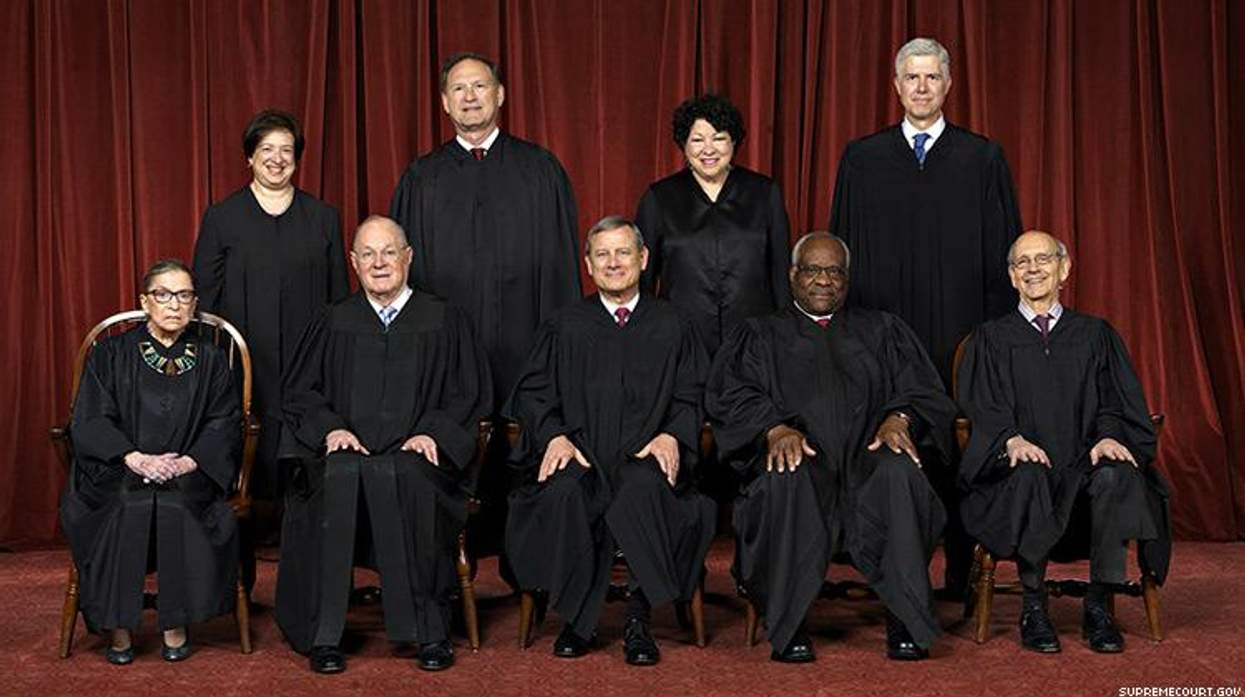It's time to get real worried about the U.S. Supreme Court and cakes.
The court just heard oral arguments in the
Masterpiece Cakeshop case, in which the
Alliance Defending Freedom -- a recognized hate group -- argues that "creative" businesses should be allowed to discriminate against same-sex couples as a matter of free speech.
(RELATED: The Mess of the Masterpiece Cakeshop Case, Explained)That's a deeply troubling proposition, but it's not new. In the 1960s, a restaurant called Piggie Park said that itshould be allowed to segregate black customers, on the basis of the owner's religious belief that black people were biblically destined for slavery.
The courts rejected his reasoning then, pointing out that while the business owner has a right to his private beliefs, a business open to the public can't violate its customers' civil rights. And that ruling has held for decades, in part because there are certain characteristics that are protected by federal law: A business isn't allowed to discriminate against customers on the basis of race, or age, or religion, for example.
Sexual orientation isn't protected by federal law -- it falls through a loophole in the Civil Rights Act. But some states have acted to close that loophole by enacting their own protections. Colorado, where the Masterpiece case originated, is one such state.
While they unanimously rejected segregation in the 1960s, today's Supreme Court seems far more open to the idea in the Masterpiece case.
As in the past, the decision may come down to Justice Anthony Kennedy as a swing vote, and during argument he provided some worrisome clues about his thinking. When an attorney for the American Civil Liberties Union explained that Colorado law prohibits discrimination on the basis of protected traits, including sexual orienation, Justice Kennedy expressed skepticism of "this whole concept of identity."
"Suppose [a business] says: 'Look, I have nothing against -- against gay people,'" Kennedy said. "He says, 'but I just don't think they should have a marriage because that's contrary to my beliefs.'"
He added that for the customers in that case, "it's not their identity; it's what they're doing."
In other words, Kennedy seems to think that the baker can discriminate against same-sex weddings without discriminating against same-sex people.
But that's just absurd. The baker's choice to refuse service obviously targets queer people, because only queer people have queer weddings. There's no doubt that this discrimination is being committed on the basis of sexual orientation, just as it would be ridiculous to say, "I'm not discriminating against Jews, I just don't want to serve people who celebrate a bar mitzvah."
"Your identity thing is just too facile," Kennedy told the ACLU attorneys, and that's deeply worrisome. It could indicate that he's falling prey to an argument that qualities like race and religion are immutable, and sexuality isn't.
If the Supreme Court is saying that sexual orientation isn't truly an identity -- if the justices agree that that's too "facile" -- it could leave queer people vulnerable to widespread discrimination. Depending on how the court rules, they may wipe out what few legal protections exist for LGBT citizens.
Only a handful of states, like Colorado, prohibit discrimination on the basis of sexual orientation. If the court decides that discrimination is protected free speech, then any business could declare themselves "creative" and deny services to LGBT citizens.
That's inconvenient when it's a cake. But it's far more dire when it's a bank denying you a loan; a landlord evicting you; a school expelling you; a hospital refusing to operate. Suddenly, private beliefs would be imposed on the public, just as the owner of Piggie Park sought to do fifty years ago.
For now, the case is in the hands of the justices, with their ruling due sometime before the end of June. We'll soon learn whether the Supreme Court still believes in a country where all people are entitled to equal protection of the law -- or whether they'd like us to slide backwards to a time when civil rights were subject to the whims of bigoted businesses.
MATT BAUME is a Seattle-based journalist and a regular contributor to The Advocate.
Follow him on Twitter @MattBaume.

Charlie Kirk DID say stoning gay people was the 'perfect law' — and these other heinous quotes